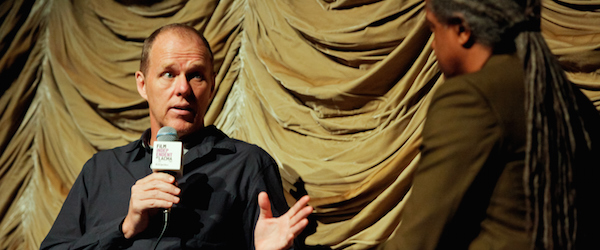Legend’s Brian Helgeland on Crime, Character and Research
If you ask Oscar-winning screenwriter Brian Helgeland what makes a good crime film, he’ll respond that it’s not the crime.
“I’m not interested in the crime, really,” said the L.A. Confidential scribe at a Film Independent at LACMA screening of his latest directorial effort, Legend. “The crime is something everyone is going to have seen before.”

Helgeland said that what makes a crime story stand out is the dynamic between the characters. In Legend, Tom Hardy plays both Ronald and Reggie Kray, twin brothers and mob kingpins in 1960s London. Ronald is a psychopath and lusts for violence, while his brother Reggie steers the ship—and brings on Frances (Emily Browning), a young woman he has fallen in love with.
Helgeland first encountered these characters during a chance run-in with a veteran of the music industry who happened to be missing a finger. “That were the Krays,” explained the gentlemen, gesturing to his missing digit.
That was 1998, a year after Helgeland won the Oscar for Best Adapted Screenplay for L.A. Confidential. He would be nominated again in 2004 for his work on Mystic River. During that whole period he was researching this strange pair of overlords. But what Helgeland found was that many of the legends about the Krays proved untrue.
The finger story was one example. “The very first story I heard of them was a lie. And the second story…and the third story…” said Helgeland. “For everything they did, there’s 25 different stories about how it happened.”
As the writer and director of the film, Helgeland was left to sort out fact from fiction. Luckily, Helgeland considers himself a skilled researcher. He attributes this talent to his collaboration with the late Tony Scott, for whom he wrote the scripts for Man on Fire and The Taking of Pelham 1 2 3. “He was so keen on research. I find that the research is just as satisfying as the finished film,” said Helgeland.
Legend teems with the culture of 1960s London—the fashion, the jazz-lounge brass and the cars. Hardy’s dual performance needed to be just as detailed.
“We were lucky that the brothers looked differently,” said Helgeland. As Ronald, Hardy is a hulking, clumsy, sluggish, mouth-breather. As Reggie, he is refined and debonair. Reggie tries desperately to control both their empire and his ruthless brother, while Frances pleads for Reggie to go straight. Time and again Reggie finds himself torn between the two. As the film progresses, we see how the stress between the three transforms the world around them.
Frances narrates the story, drawing the audience into the eye of the storm. Helgeland said she was an elusive character to research. His search for details about her eventually led him to take a tour of London’s East End from one of the Kray’s prison-mates, walking the same streets the pair would walk, back when Reggie Kray owned the city.
“I didn’t want to invent anything about her. But I wanted to add the voice-over so I could justify a different point-of-view from her.” In adding the voice-over, Helgeland gives Browning’s Frances her own dual nature: the Frances enamored with Reggie and the Frances who knows better.
Legend gets its name from the folklore that remains of the brothers, but the film gives us an insider’s look at what really happened. With in-depth research and meticulous attention to detail, Helgeland engenders the story with grit, humor and tragedy and brings the facts front and center.
Daniel Larios / Film Independent Blogger